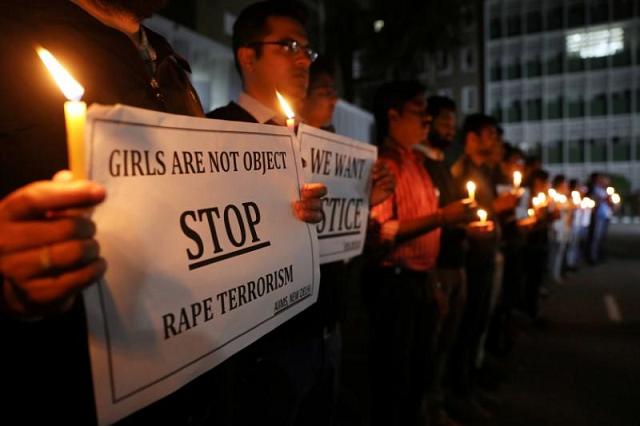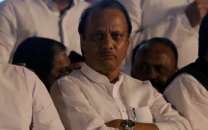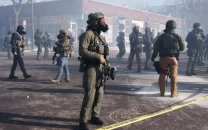India executes four men for brutal 2012 Delhi bus rape and murder
The men were executed at dawn in Tihar jail, on the outskirts of the capital

Resident doctors and medical students from All India Institute Of Medical Sciences (AIIMS) attend a candle-lit march to protest against the alleged rape and murder of a 27-year-old woman on the outskirts of Hyderabad, in New Delhi, India, December 3, 2019. PHOTO: REUTERS
The men were executed at dawn in Tihar jail, on the outskirts of the capital, two prison officials said.
Hundreds of police were deployed outside the jail to control a crowd that waited to celebrate the execution. Some held placards that read “Justice for women” and “Hang the culprits”.
The crime, which happened on the night of December 16, 2012, sparked massive protests and global outrage. The victim was dubbed Nirbhaya - the fearless one - by the Indian press, as she could not be named under Indian law.
“Today, justice has been done after seven years,” the victim’s mother told reporters outside the prison. “I salute Indian judiciary and thank god for hearing our prayers...my daughter’s soul can now rest in peace.”
Six men were arrested for the brutal attack. One suspect, Ram Singh, was found dead in his jail cell in March 2013, having apparently taken his own life.
Another, who was aged 17 at the time, was released in 2015 after serving three years in a reform facility - the maximum term possible for a juvenile in India.
The four hanged on Friday were gym instructor Vinay Sharma, bus cleaner Akshay Thakur, fruit-seller Pawan Gupta and unemployed Mukesh Singh, who were all sentenced to death by a fast-track court in 2013.
In 2017, the Supreme Court upheld death sentences against four men, with judges ruling the crime met the “rarest of the rare” standard required to justify capital punishment in India.
India’s president rejected pleas for clemency from the condemned men, after the Supreme Court dismissed their pleas for a review of the death sentences.
Attacked on a moving bus and left for dead on roadside, the victim, a 23-year-old physiotherapy student, clung to life for two weeks before succumbing to her injuries. She died in a hospital in Singapore, where she had been transferred in a desperate attempt to save her.
Outrage over her death led to India passing tough new laws against sexual violence, including the death penalty for rape in some cases.
Still, one woman reported a rape every 15 minutes on average in India in 2018, according to government data released last month, underlining the country’s reputation as one of the worst places in the world to be female.
Women reported almost 34,000 rapes in 2018, barely changed from the year before. Just over 85% led to charges, and 27% to convictions, according to the annual crime report released by the federal home ministry.
Activists say the government statistics understate the number of rapes as it is still considered a taboo by conservative Indians to report sexual violence.
TIMELINE
Dec 16, 2012 - A 23-year-old physiotherapy student is brutally raped on a moving bus in the Indian capital of New Delhi. She and her male companion are tortured. A metal pipe is shoved into her abdomen, and a large section of her intestine are pulled out. She is thrown on the roadside and left for dead. Five men and a juvenile are arrested. Shocked by the brutality of the crime, large crowds gather for candlelit vigils in cities throughout the country, expressing outrage and praying for the victim as she clings to life.
Dec 29, 2012 - The victim dies in a hospital in Singapore after battling serious internal injuries. Protests erupt across India, calling out government indifference, gaps in law-enforcement and rising sexual crimes against women.
Jan 17 2013 - A fast-track court begins proceedings against the five men and one juvenile in the case.
March 11, 2013 - Ram Singh, one of the main accused in the case and the driver of the bus, is found hanging in his prison cell.
April 2, 2013 - A tough new anti-rape law is passed, making stalking a crime and introducing the death sentence for convicted rapists.
September 2013 - The fast-track court sentences all four adult men to death in the case. The juvenile accused is remanded to a three-year term in a detention centre and is released in 2015, after serving his term.
May 5, 2017 - India’s Supreme Court upholds the death penalty of the four remaining convicts. The men file review petitions challenging the order.
Jan 17, 2020 - Indian President Ram Nath Kovind rejects their pleas for mercy.
March 20, 2020 - The four men - gym instructor Vinay Sharma, bus cleaner Akshay Thakur, fruit-seller Pawan Gupta and unemployed Mukesh Singh - are hanged at dawn in New Delhi’s Tihar prison.


1611687109-0/image-(3)1611687109-0-208x130.webp)
















COMMENTS
Comments are moderated and generally will be posted if they are on-topic and not abusive.
For more information, please see our Comments FAQ